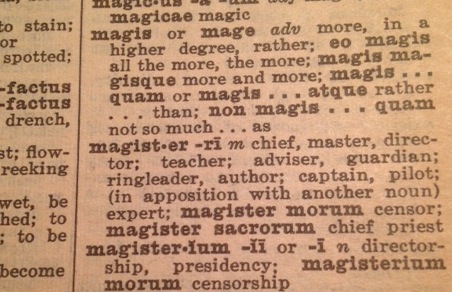I started off reading Livy in Penguin editions, but the last volume of their set is apparently abridged, so when I recently started back up on the history of Rome Ab Urbe Condita, I started borrowing the Loebs. The Loeb Classical Library is well known for its red and green volumes of Latin and Greek text with facing translations. It’s sometimes criticized for prosy or out of date translations, and it would be a bit of a stretch for me to claim that the original texts are really any use to me. But here are some wonderful words and phrases I would have completely missed out on if it weren’t for the Loebs:
“superos inferosque deos”
“archipirata”
“magistro elephantorum”
“sed rerum natura”
“Quid autem, si vox libera non sit, liberum esse?”
“cogitatoque hiemis quam longa siet.”
“Superos inferosque deos” means “gods above and below”, “inferosque” being cognate to “infernal”, I imagine. The -que is a suffix meaning “and”, which often adds a poetic ring, as in “arma virumque cano”.
“Archipirata” should be obvious: pirate captain. This turns up in an interesting and nasty conflict between two Rhodian captains during the war with King Antiochus of Asia. The Greek island of Rhodes had an excellent navy; they were allied to the Romans but one of their exiled nobles was admiral for Antiochus. This exiled captain pretended that he wished to defect, and promised the leader of the Rhodian allies, whom he hated, that he would let the fleet under his command grow slack and give them up. Livy reports how the allied captain became every bit as slack and unwary as the man he hoped to bring in. In an action involving the “archipirata” as well as the Rhodian exile, the Roman fleet was badly mauled and the credulous admiral killed.
“Magistro elephantorum” is another obvious one, the master of elephants. War elephants, in this context. Livy pulls out the stops describing the Battle of Magnesia, where Antiochus’ power was broken. Some fifty elephants are said to have worn head armor and carried towers holding four men each. They didn’t save the king, however, and the treaty he made with the Romans specified that he would give up all of his elephants, which must have made him very sad.
“Sed rerum natura” echoes the title of Lucretius’ De Rerum Natura, meaning On the Nature of Things. Here it means something like “but that’s the way things are”, but it obviously sounds much better. If I remember correctly, this was uttered by the more democratic Greek allies of Rome who began to make awkward demands with regard to another Roman ally, King Eumenes. Democrats and autocrats can never really get along, it’s the nature of things.
“What, pray, was free, if there was no free speech?” In a similar situation, Greek cities complained that Philip of Macedon, once defeated and now a Roman ally, was infringing on the freedoms guaranteed by the Romans themselves. It sounds great but in other places Livy is rather contemptuous of this kind of thing. Somewhere else he describes Athenian ships so laden down with decrees praising the Romans and attacking their enemies that they could hardly move.
“Cogitatoque hiemis quam longa siet.” “And remember how long winter lasts.” This last is from Cato the Elder’s work on farming, giving advice on storing fodder for animals. Elm leaves were good, apparently. I’m reading Cato because he shows up in Livy around this time, 200 b.c., as an all around formidable guy, and his one surviving book is one of the oldest Latin prose texts in existence. He would definitely have gotten along with the Starks.
And if you’ve read along this far, I’ll tell you that on page 329 of volume eleven, the Romans held a council “at Clitoris in Arcadia”. This is not how the place name is rendered in other translations.
What do you think, should the Loeb Classical Library give me a sponsorship?

Perhaps Cato’s comment about winter should be contributed to the current Facebook furor (based on statements from NOAA?) about next winter and El Nino.